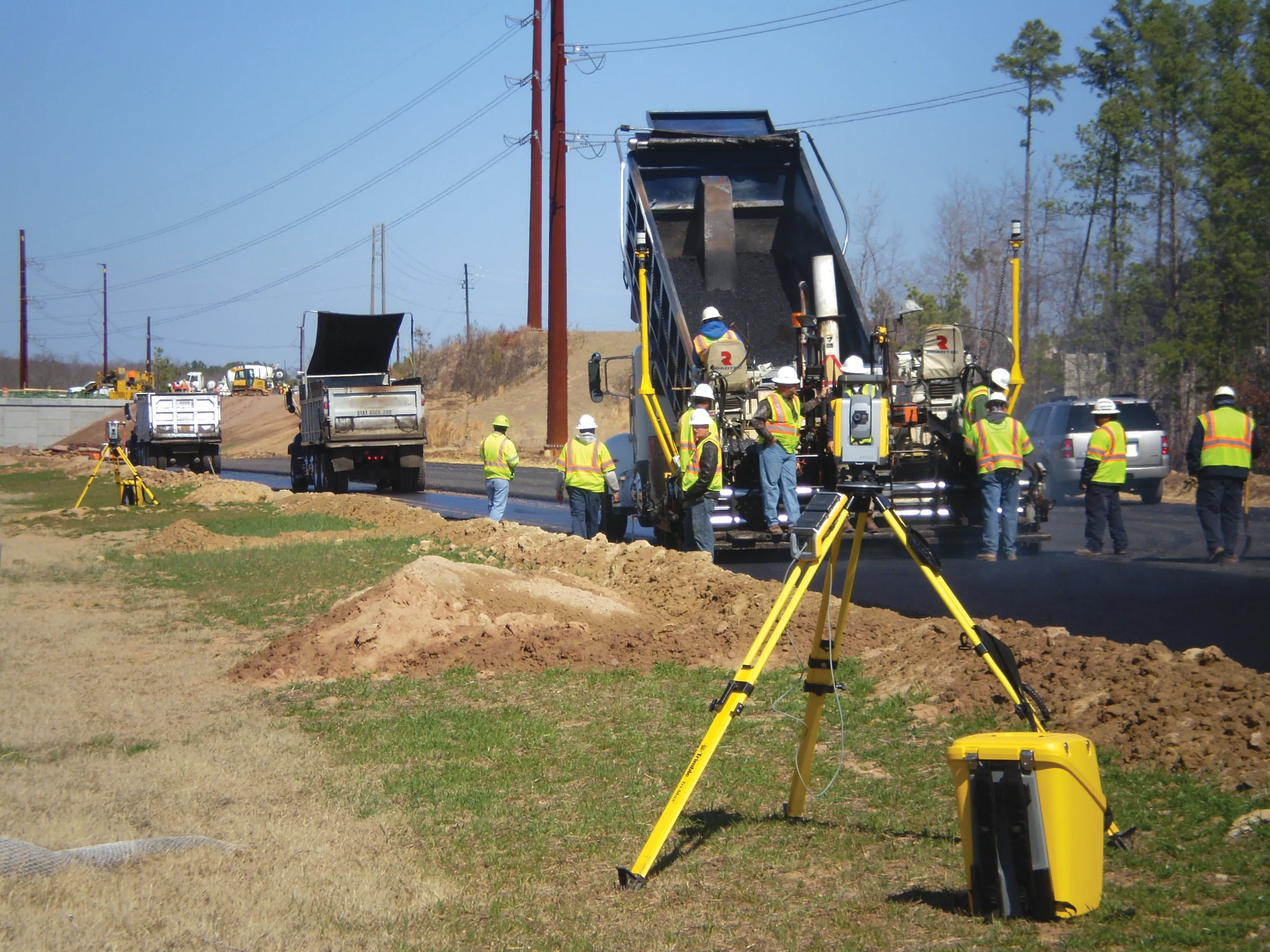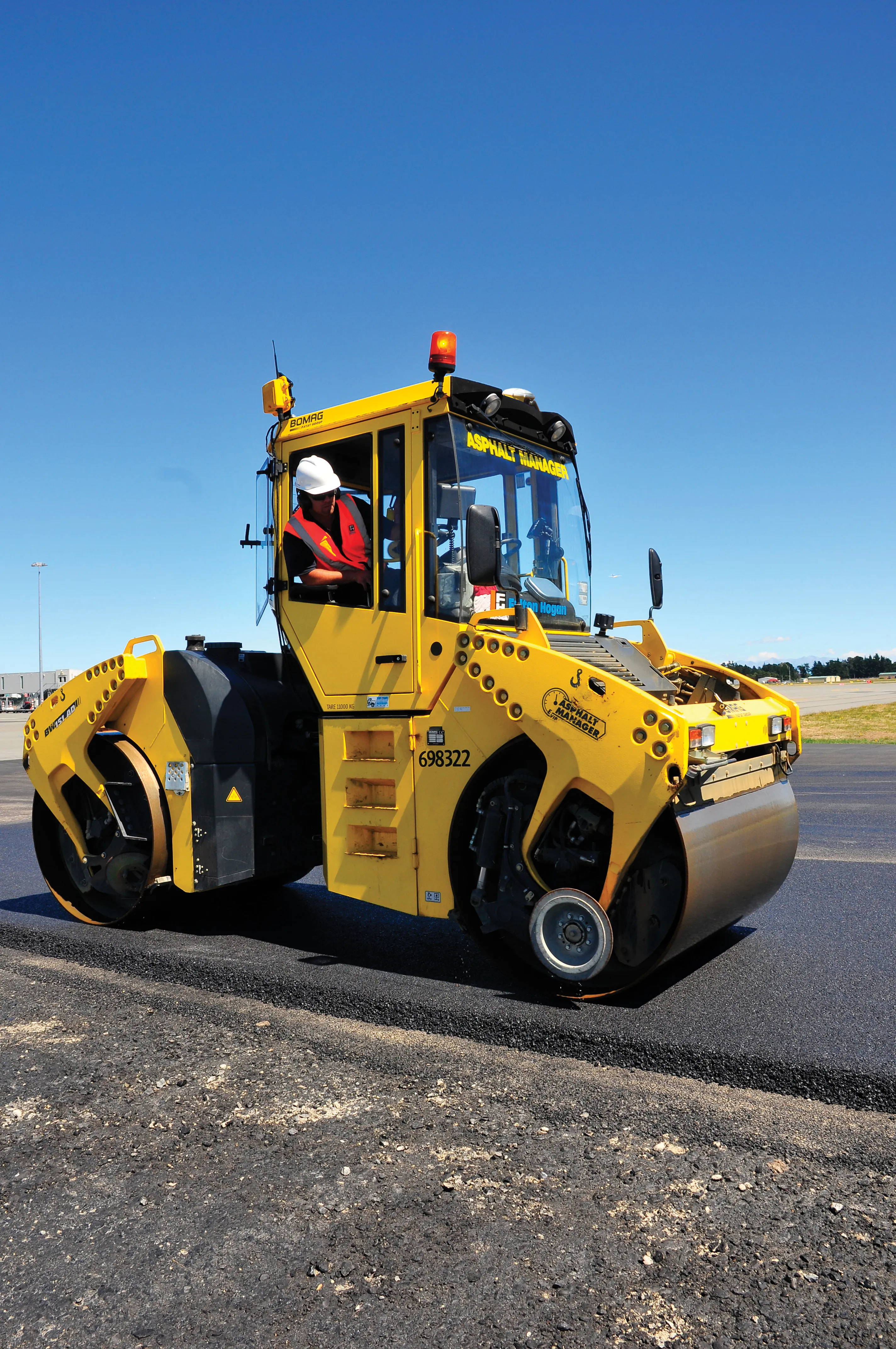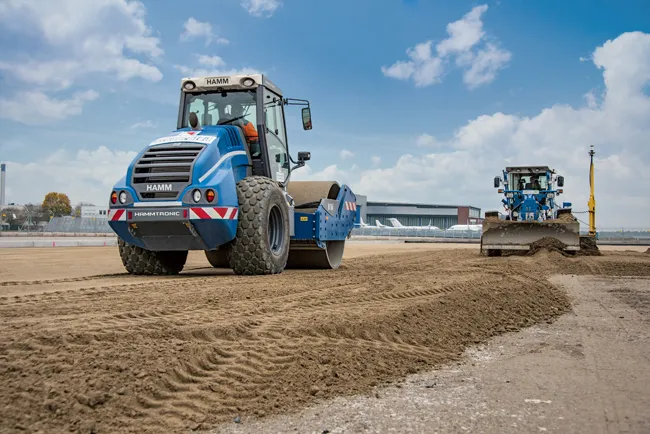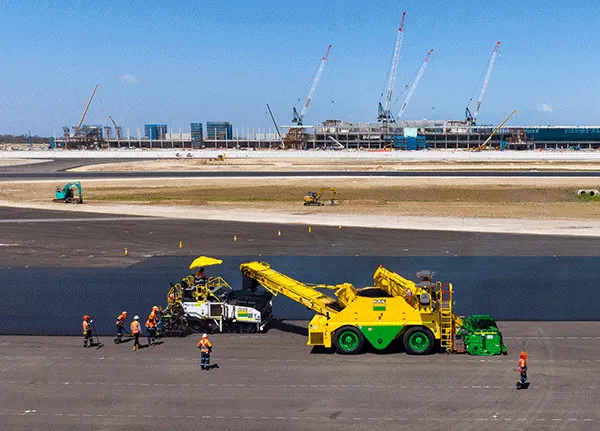August 2, 2016
A large fleet of asphalt road construction machines has been used at the Eindhoven Airbase in the Netherlands to reconstruct the runway.
Contractor7456 BAM Infra carried out the work to resurface the runway to the tight specifications and tight time frame requirements of the Royal Dutch Airforce.
In all, nine asphalt pavers were employed simultaneously to lay the new runway surface. Running the nine machines in echelon allowed hot-to-hot paving, effectively without a joint in between. Working together the pavers were able to resurface the 3km long runway to a width of 45m within 11 hours.
To achieve this high-production, high-quality project, some 130 trucks were used to supply the 10,500tonnes of asphalt needed for the work. The material was produced in five separate asphalt plants in the Netherlands, which are operated by the contractor. Controlling this complex logistics operation efficiently was crucial to the delivery of the project, with BAM making extensive use of its APEX software for this key task.
This package allowed the firm to monitor the progress of all the asphalt supply trucks and see when they would arrive onsite. BAM also monitored the consistency of the asphalt being produced in the plants continually, to ensure that the material was both homogenous and to the specification required.
The use of nine pavers was selected because of the slope of the mat, the design of the binder layer and above all the very strict requirements of the Airforce considering the flatness of the mat. This paving method has been used by BAM Infra for other runway projects, at Leeuwarden Airport and Volkel Air Base, where the technique has been both proven and refined to optimise efficiency.
The nine pavers were all from1194 Vögele, with five Super 1800-3i models, three Super 1900-3i units and one 2100-2 machine. The contractor has been a strong customer for road machines from the 364 Wirtgen Group for the last five years. However, a 1252 Roadtec Shuttle Buggy was used to supply a continuous flow of asphalt to the paver located in the middle. The pavers on either side of the central machine also had screeds set to a slightly wider paving width, as this better suited the arrangement of the equipment.
These machines were operated in a v-formation, with the Shuttle Buggy supplying the central paver. It would have been difficult for trucks to tip into this central unit otherwise, due to the close proximity of so many other vehicles and items of equipment.
The v-formation, with the sides ahead, was chosen to give the roller operators the opportunity to change direction at the side of the runway and not in the (more critical) middle of the mat.
In addition to the nine pavers, BAM also assembled a fleet of no less than 27 compactors. The firm used 10228 Hamm tandem drum models (a combination of DV70 and DV90 units), as well as 15 of the HW 90 dead weight types, while a further two rollers were kept in reserve as back-up units. Another important tool used by the contractor was the Hamm HCQ system, which was employed to coordinate the most important work carried out by the tandem drum rollers and optimise the compaction work. This allowed the operators of the compactors to see the mat on a screen, with colour coding showing the work still to be carried out. Because all 10 HCQ-systems were communicating and sharing data through a Wi-Fi connection, all operators were aware of the compaction carried out by the colleagues within the compaction-team.
Assistance was given to BAM by Wirtgen NL, to ensure that all of the machines and technology ran as required.
Images courtesy of the Netherlands Ministry of Defence
Contractor
In all, nine asphalt pavers were employed simultaneously to lay the new runway surface. Running the nine machines in echelon allowed hot-to-hot paving, effectively without a joint in between. Working together the pavers were able to resurface the 3km long runway to a width of 45m within 11 hours.
To achieve this high-production, high-quality project, some 130 trucks were used to supply the 10,500tonnes of asphalt needed for the work. The material was produced in five separate asphalt plants in the Netherlands, which are operated by the contractor. Controlling this complex logistics operation efficiently was crucial to the delivery of the project, with BAM making extensive use of its APEX software for this key task.
This package allowed the firm to monitor the progress of all the asphalt supply trucks and see when they would arrive onsite. BAM also monitored the consistency of the asphalt being produced in the plants continually, to ensure that the material was both homogenous and to the specification required.
The use of nine pavers was selected because of the slope of the mat, the design of the binder layer and above all the very strict requirements of the Airforce considering the flatness of the mat. This paving method has been used by BAM Infra for other runway projects, at Leeuwarden Airport and Volkel Air Base, where the technique has been both proven and refined to optimise efficiency.
The nine pavers were all from
These machines were operated in a v-formation, with the Shuttle Buggy supplying the central paver. It would have been difficult for trucks to tip into this central unit otherwise, due to the close proximity of so many other vehicles and items of equipment.
The v-formation, with the sides ahead, was chosen to give the roller operators the opportunity to change direction at the side of the runway and not in the (more critical) middle of the mat.
In addition to the nine pavers, BAM also assembled a fleet of no less than 27 compactors. The firm used 10
Assistance was given to BAM by Wirtgen NL, to ensure that all of the machines and technology ran as required.
Images courtesy of the Netherlands Ministry of Defence









